A Comprehensive Report on the Health Benefits of Vegetarian Diet
VerifiedAdded on 2023/06/11
|10
|2527
|259
Report
AI Summary
This report provides an argumentative analysis of vegetarian diets and their impact on health. It begins by defining vegetarianism and outlining its various forms (ovo-lacto, lacto, ovo, and vegan). The report details the constituents of a vegetarian diet, emphasizing plant-based foods, eggs, honey, and dairy products. It explores the benefits, including reduced risk of iron and zinc deficiencies, and prevention of non-communicable diseases like heart disease, type 2 diabetes, and obesity. The report also addresses potential disadvantages, such as vitamin B12 and omega-3 fatty acid deficiencies, and suggests supplementation and increased intake of plant-based ALA sources to mitigate these risks. The conclusion suggests that while vegetarian diets offer numerous health benefits, supplementation is necessary for optimal health.
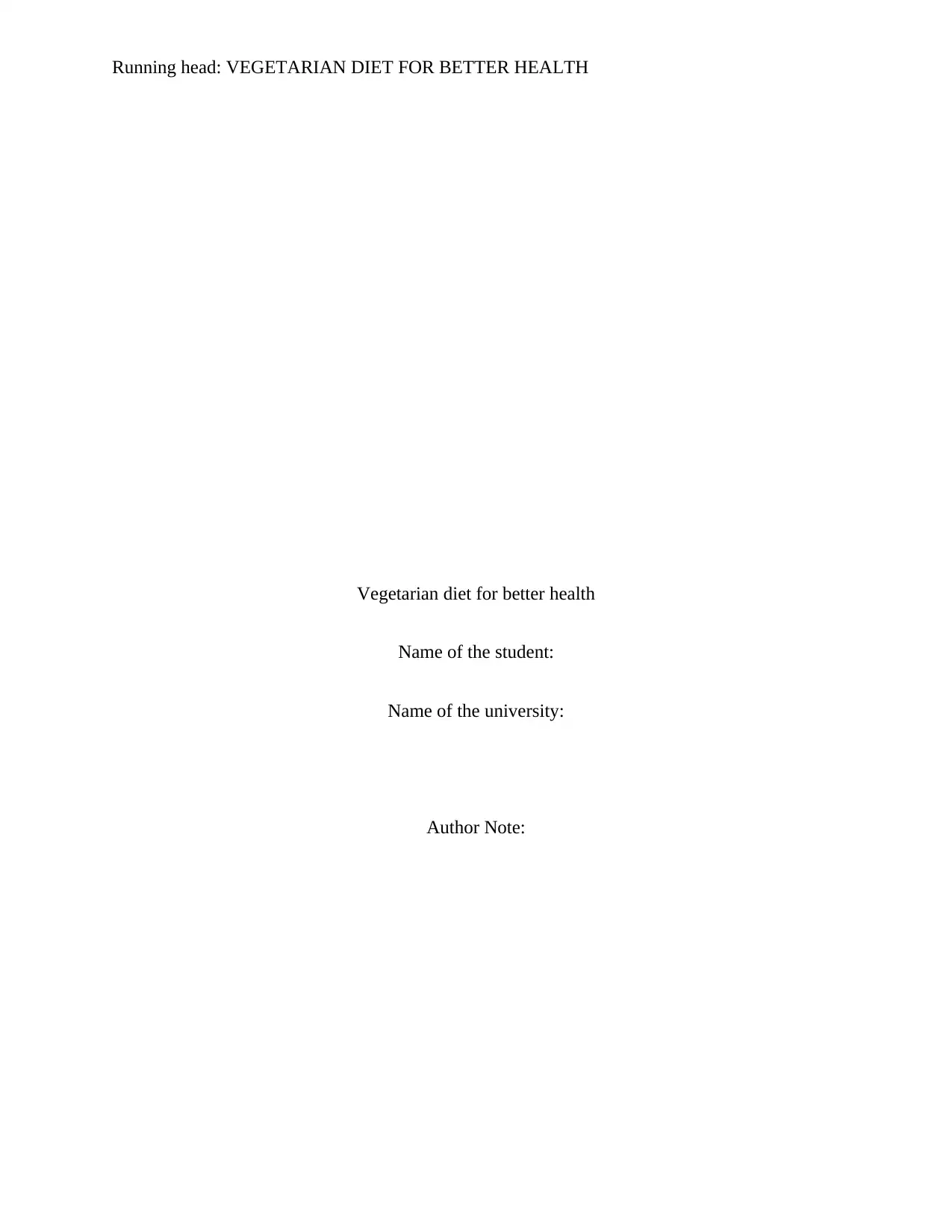
Running head: VEGETARIAN DIET FOR BETTER HEALTH
Vegetarian diet for better health
Name of the student:
Name of the university:
Author Note:
Vegetarian diet for better health
Name of the student:
Name of the university:
Author Note:
Paraphrase This Document
Need a fresh take? Get an instant paraphrase of this document with our AI Paraphraser
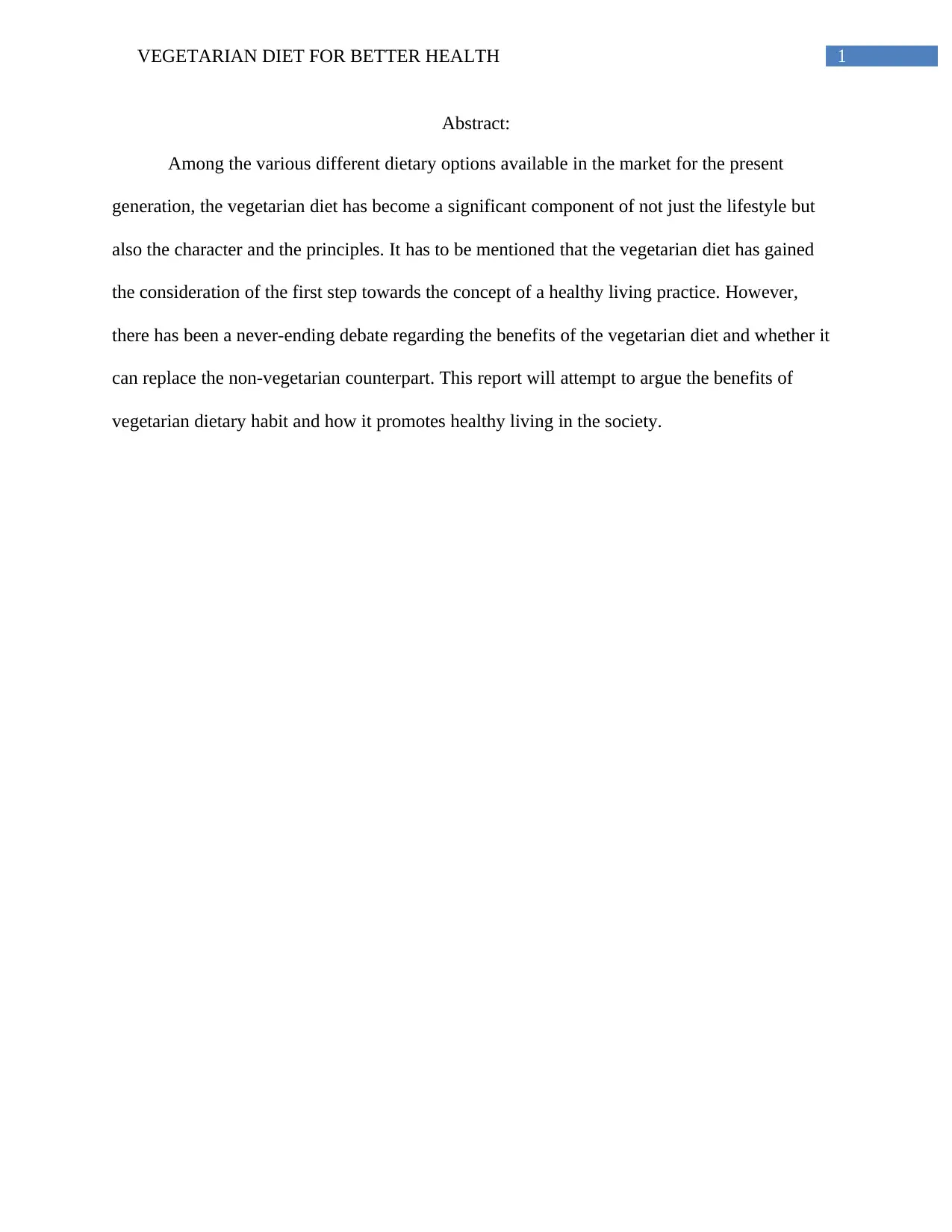
1VEGETARIAN DIET FOR BETTER HEALTH
Abstract:
Among the various different dietary options available in the market for the present
generation, the vegetarian diet has become a significant component of not just the lifestyle but
also the character and the principles. It has to be mentioned that the vegetarian diet has gained
the consideration of the first step towards the concept of a healthy living practice. However,
there has been a never-ending debate regarding the benefits of the vegetarian diet and whether it
can replace the non-vegetarian counterpart. This report will attempt to argue the benefits of
vegetarian dietary habit and how it promotes healthy living in the society.
Abstract:
Among the various different dietary options available in the market for the present
generation, the vegetarian diet has become a significant component of not just the lifestyle but
also the character and the principles. It has to be mentioned that the vegetarian diet has gained
the consideration of the first step towards the concept of a healthy living practice. However,
there has been a never-ending debate regarding the benefits of the vegetarian diet and whether it
can replace the non-vegetarian counterpart. This report will attempt to argue the benefits of
vegetarian dietary habit and how it promotes healthy living in the society.
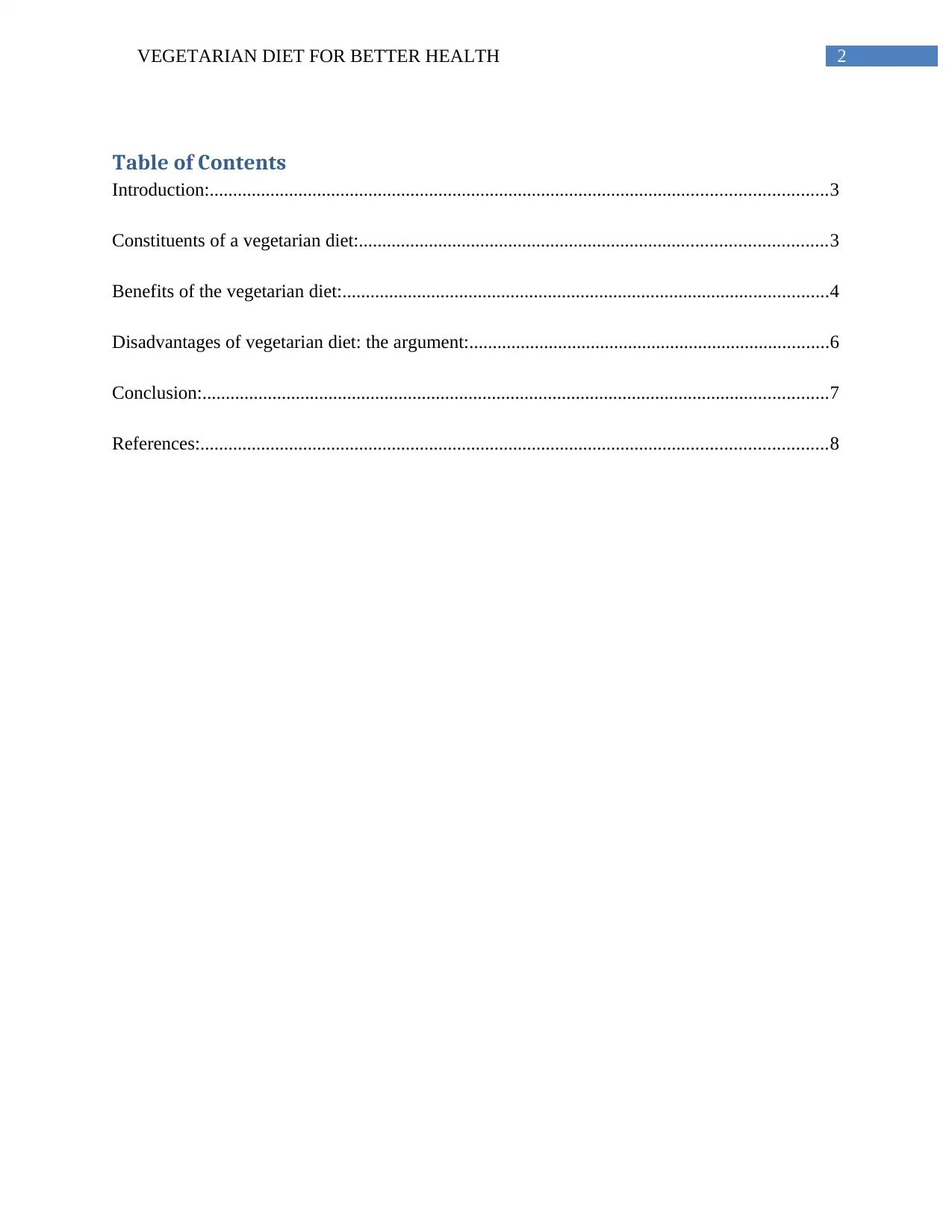
2VEGETARIAN DIET FOR BETTER HEALTH
Table of Contents
Introduction:....................................................................................................................................3
Constituents of a vegetarian diet:....................................................................................................3
Benefits of the vegetarian diet:........................................................................................................4
Disadvantages of vegetarian diet: the argument:.............................................................................6
Conclusion:......................................................................................................................................7
References:......................................................................................................................................8
Table of Contents
Introduction:....................................................................................................................................3
Constituents of a vegetarian diet:....................................................................................................3
Benefits of the vegetarian diet:........................................................................................................4
Disadvantages of vegetarian diet: the argument:.............................................................................6
Conclusion:......................................................................................................................................7
References:......................................................................................................................................8
⊘ This is a preview!⊘
Do you want full access?
Subscribe today to unlock all pages.

Trusted by 1+ million students worldwide
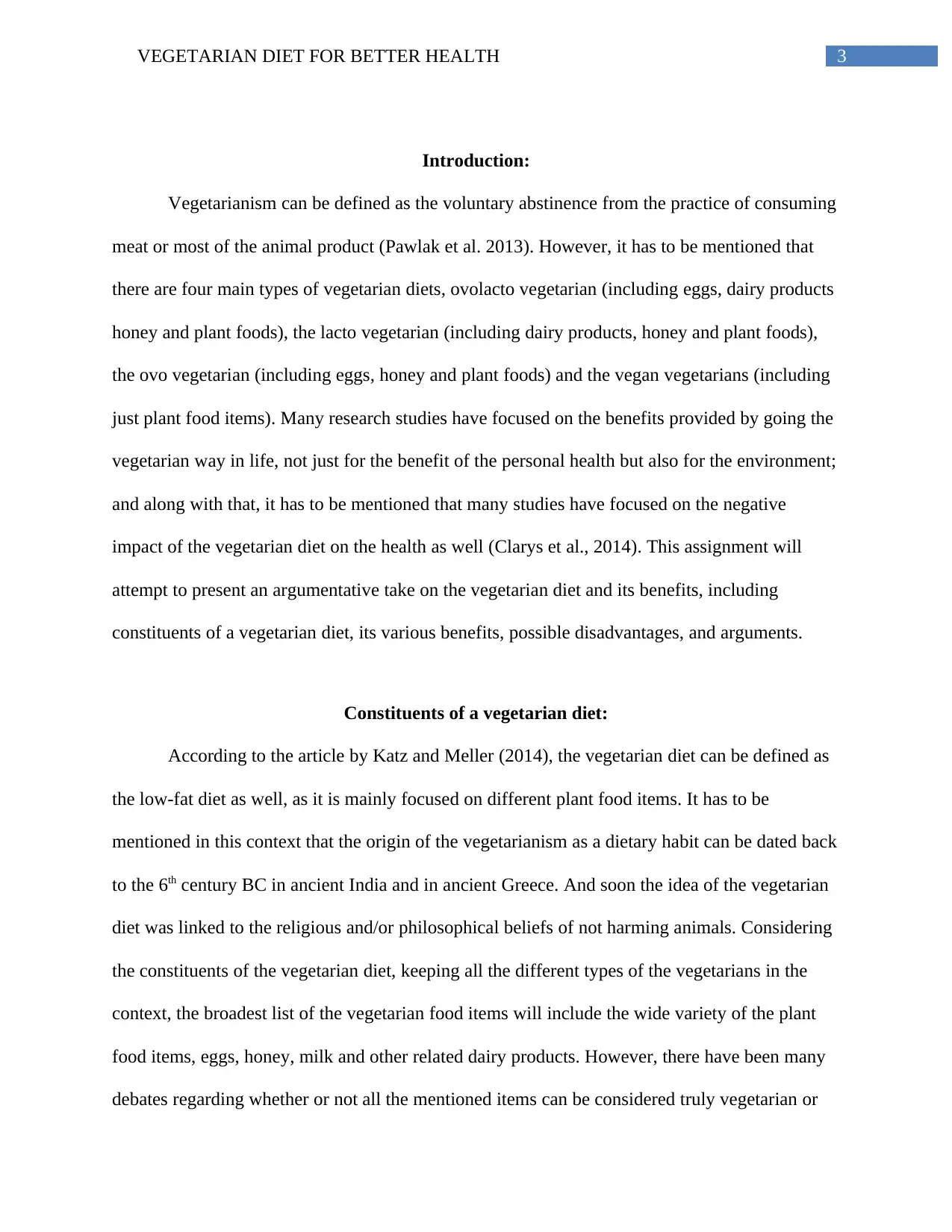
3VEGETARIAN DIET FOR BETTER HEALTH
Introduction:
Vegetarianism can be defined as the voluntary abstinence from the practice of consuming
meat or most of the animal product (Pawlak et al. 2013). However, it has to be mentioned that
there are four main types of vegetarian diets, ovolacto vegetarian (including eggs, dairy products
honey and plant foods), the lacto vegetarian (including dairy products, honey and plant foods),
the ovo vegetarian (including eggs, honey and plant foods) and the vegan vegetarians (including
just plant food items). Many research studies have focused on the benefits provided by going the
vegetarian way in life, not just for the benefit of the personal health but also for the environment;
and along with that, it has to be mentioned that many studies have focused on the negative
impact of the vegetarian diet on the health as well (Clarys et al., 2014). This assignment will
attempt to present an argumentative take on the vegetarian diet and its benefits, including
constituents of a vegetarian diet, its various benefits, possible disadvantages, and arguments.
Constituents of a vegetarian diet:
According to the article by Katz and Meller (2014), the vegetarian diet can be defined as
the low-fat diet as well, as it is mainly focused on different plant food items. It has to be
mentioned in this context that the origin of the vegetarianism as a dietary habit can be dated back
to the 6th century BC in ancient India and in ancient Greece. And soon the idea of the vegetarian
diet was linked to the religious and/or philosophical beliefs of not harming animals. Considering
the constituents of the vegetarian diet, keeping all the different types of the vegetarians in the
context, the broadest list of the vegetarian food items will include the wide variety of the plant
food items, eggs, honey, milk and other related dairy products. However, there have been many
debates regarding whether or not all the mentioned items can be considered truly vegetarian or
Introduction:
Vegetarianism can be defined as the voluntary abstinence from the practice of consuming
meat or most of the animal product (Pawlak et al. 2013). However, it has to be mentioned that
there are four main types of vegetarian diets, ovolacto vegetarian (including eggs, dairy products
honey and plant foods), the lacto vegetarian (including dairy products, honey and plant foods),
the ovo vegetarian (including eggs, honey and plant foods) and the vegan vegetarians (including
just plant food items). Many research studies have focused on the benefits provided by going the
vegetarian way in life, not just for the benefit of the personal health but also for the environment;
and along with that, it has to be mentioned that many studies have focused on the negative
impact of the vegetarian diet on the health as well (Clarys et al., 2014). This assignment will
attempt to present an argumentative take on the vegetarian diet and its benefits, including
constituents of a vegetarian diet, its various benefits, possible disadvantages, and arguments.
Constituents of a vegetarian diet:
According to the article by Katz and Meller (2014), the vegetarian diet can be defined as
the low-fat diet as well, as it is mainly focused on different plant food items. It has to be
mentioned in this context that the origin of the vegetarianism as a dietary habit can be dated back
to the 6th century BC in ancient India and in ancient Greece. And soon the idea of the vegetarian
diet was linked to the religious and/or philosophical beliefs of not harming animals. Considering
the constituents of the vegetarian diet, keeping all the different types of the vegetarians in the
context, the broadest list of the vegetarian food items will include the wide variety of the plant
food items, eggs, honey, milk and other related dairy products. However, there have been many
debates regarding whether or not all the mentioned items can be considered truly vegetarian or
Paraphrase This Document
Need a fresh take? Get an instant paraphrase of this document with our AI Paraphraser
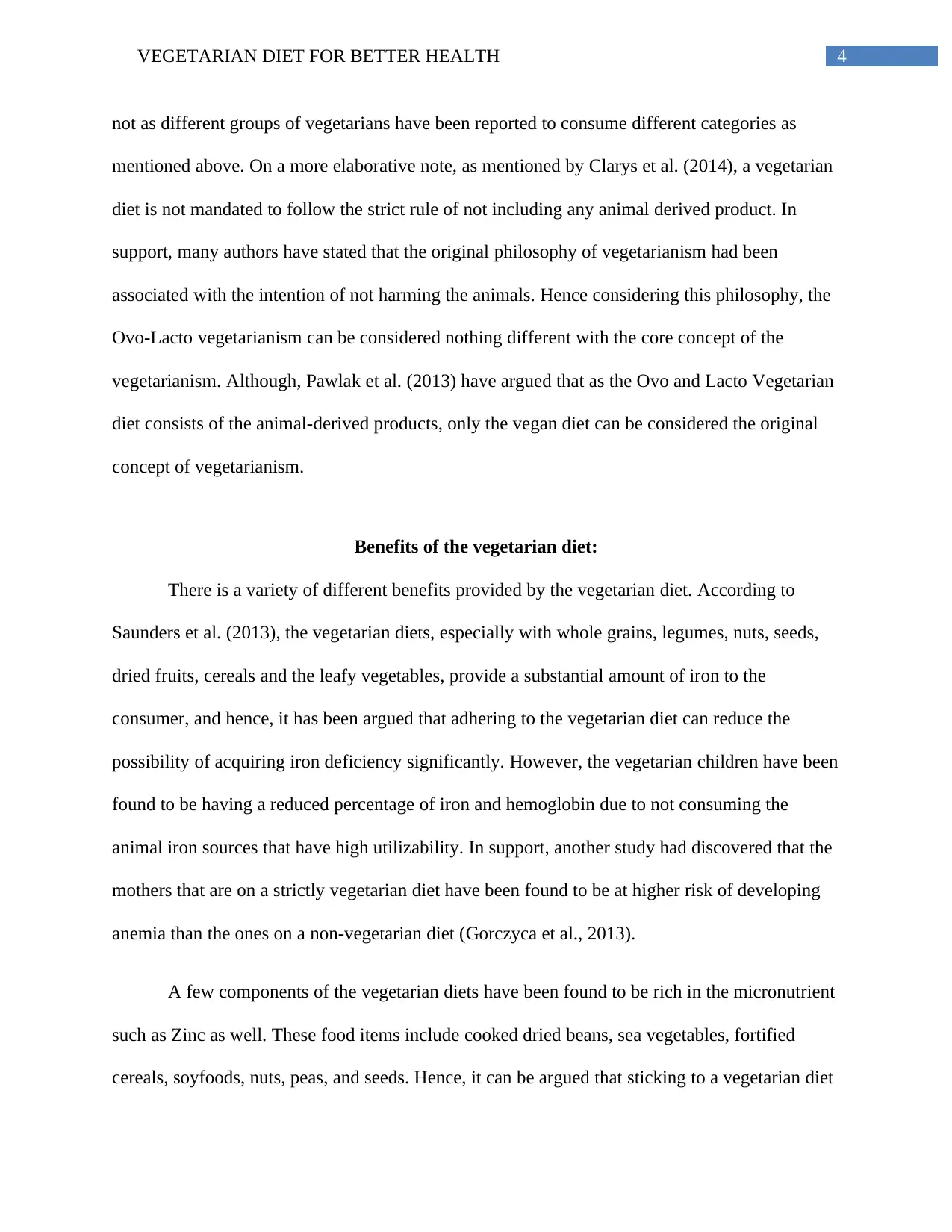
4VEGETARIAN DIET FOR BETTER HEALTH
not as different groups of vegetarians have been reported to consume different categories as
mentioned above. On a more elaborative note, as mentioned by Clarys et al. (2014), a vegetarian
diet is not mandated to follow the strict rule of not including any animal derived product. In
support, many authors have stated that the original philosophy of vegetarianism had been
associated with the intention of not harming the animals. Hence considering this philosophy, the
Ovo-Lacto vegetarianism can be considered nothing different with the core concept of the
vegetarianism. Although, Pawlak et al. (2013) have argued that as the Ovo and Lacto Vegetarian
diet consists of the animal-derived products, only the vegan diet can be considered the original
concept of vegetarianism.
Benefits of the vegetarian diet:
There is a variety of different benefits provided by the vegetarian diet. According to
Saunders et al. (2013), the vegetarian diets, especially with whole grains, legumes, nuts, seeds,
dried fruits, cereals and the leafy vegetables, provide a substantial amount of iron to the
consumer, and hence, it has been argued that adhering to the vegetarian diet can reduce the
possibility of acquiring iron deficiency significantly. However, the vegetarian children have been
found to be having a reduced percentage of iron and hemoglobin due to not consuming the
animal iron sources that have high utilizability. In support, another study had discovered that the
mothers that are on a strictly vegetarian diet have been found to be at higher risk of developing
anemia than the ones on a non-vegetarian diet (Gorczyca et al., 2013).
A few components of the vegetarian diets have been found to be rich in the micronutrient
such as Zinc as well. These food items include cooked dried beans, sea vegetables, fortified
cereals, soyfoods, nuts, peas, and seeds. Hence, it can be argued that sticking to a vegetarian diet
not as different groups of vegetarians have been reported to consume different categories as
mentioned above. On a more elaborative note, as mentioned by Clarys et al. (2014), a vegetarian
diet is not mandated to follow the strict rule of not including any animal derived product. In
support, many authors have stated that the original philosophy of vegetarianism had been
associated with the intention of not harming the animals. Hence considering this philosophy, the
Ovo-Lacto vegetarianism can be considered nothing different with the core concept of the
vegetarianism. Although, Pawlak et al. (2013) have argued that as the Ovo and Lacto Vegetarian
diet consists of the animal-derived products, only the vegan diet can be considered the original
concept of vegetarianism.
Benefits of the vegetarian diet:
There is a variety of different benefits provided by the vegetarian diet. According to
Saunders et al. (2013), the vegetarian diets, especially with whole grains, legumes, nuts, seeds,
dried fruits, cereals and the leafy vegetables, provide a substantial amount of iron to the
consumer, and hence, it has been argued that adhering to the vegetarian diet can reduce the
possibility of acquiring iron deficiency significantly. However, the vegetarian children have been
found to be having a reduced percentage of iron and hemoglobin due to not consuming the
animal iron sources that have high utilizability. In support, another study had discovered that the
mothers that are on a strictly vegetarian diet have been found to be at higher risk of developing
anemia than the ones on a non-vegetarian diet (Gorczyca et al., 2013).
A few components of the vegetarian diets have been found to be rich in the micronutrient
such as Zinc as well. These food items include cooked dried beans, sea vegetables, fortified
cereals, soyfoods, nuts, peas, and seeds. Hence, it can be argued that sticking to a vegetarian diet
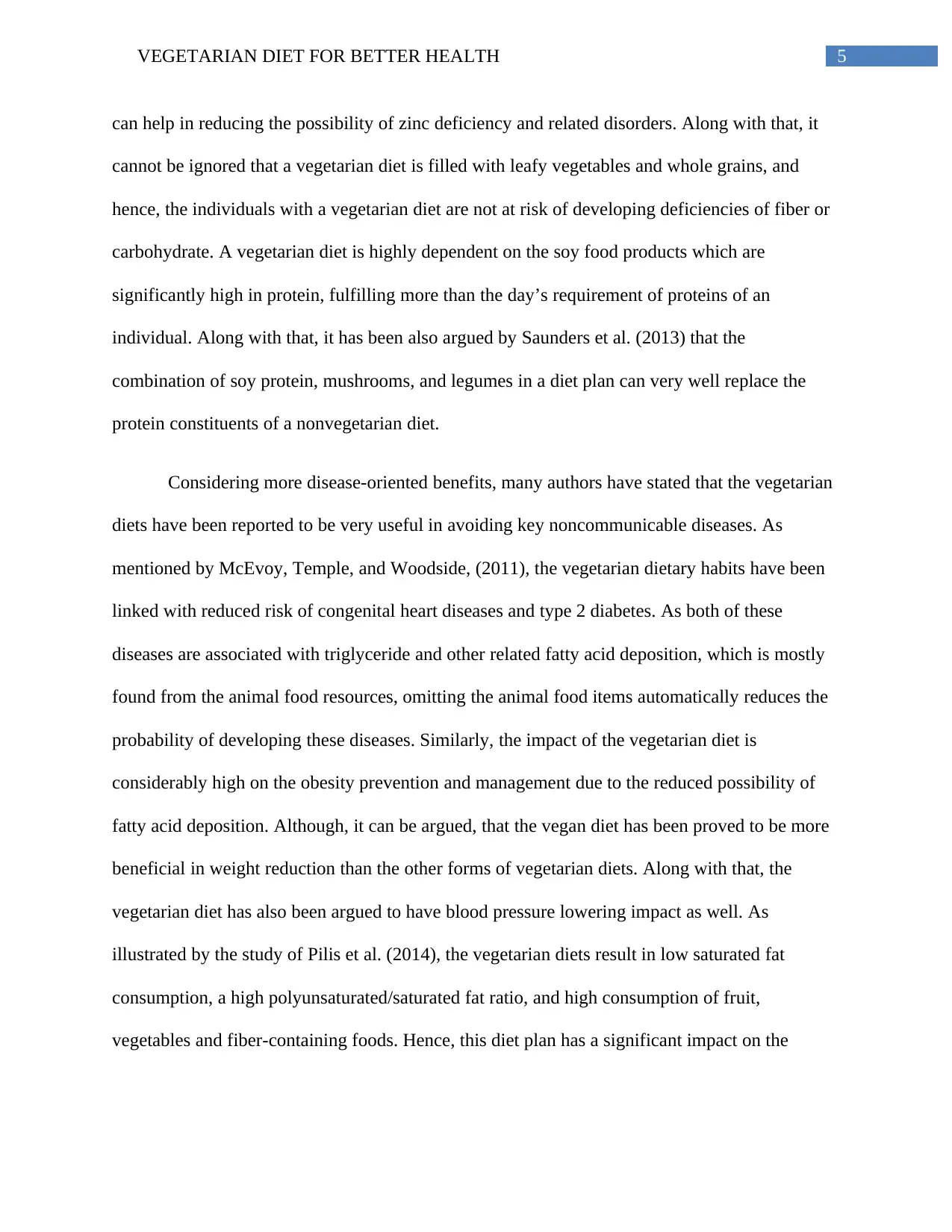
5VEGETARIAN DIET FOR BETTER HEALTH
can help in reducing the possibility of zinc deficiency and related disorders. Along with that, it
cannot be ignored that a vegetarian diet is filled with leafy vegetables and whole grains, and
hence, the individuals with a vegetarian diet are not at risk of developing deficiencies of fiber or
carbohydrate. A vegetarian diet is highly dependent on the soy food products which are
significantly high in protein, fulfilling more than the day’s requirement of proteins of an
individual. Along with that, it has been also argued by Saunders et al. (2013) that the
combination of soy protein, mushrooms, and legumes in a diet plan can very well replace the
protein constituents of a nonvegetarian diet.
Considering more disease-oriented benefits, many authors have stated that the vegetarian
diets have been reported to be very useful in avoiding key noncommunicable diseases. As
mentioned by McEvoy, Temple, and Woodside, (2011), the vegetarian dietary habits have been
linked with reduced risk of congenital heart diseases and type 2 diabetes. As both of these
diseases are associated with triglyceride and other related fatty acid deposition, which is mostly
found from the animal food resources, omitting the animal food items automatically reduces the
probability of developing these diseases. Similarly, the impact of the vegetarian diet is
considerably high on the obesity prevention and management due to the reduced possibility of
fatty acid deposition. Although, it can be argued, that the vegan diet has been proved to be more
beneficial in weight reduction than the other forms of vegetarian diets. Along with that, the
vegetarian diet has also been argued to have blood pressure lowering impact as well. As
illustrated by the study of Pilis et al. (2014), the vegetarian diets result in low saturated fat
consumption, a high polyunsaturated/saturated fat ratio, and high consumption of fruit,
vegetables and fiber-containing foods. Hence, this diet plan has a significant impact on the
can help in reducing the possibility of zinc deficiency and related disorders. Along with that, it
cannot be ignored that a vegetarian diet is filled with leafy vegetables and whole grains, and
hence, the individuals with a vegetarian diet are not at risk of developing deficiencies of fiber or
carbohydrate. A vegetarian diet is highly dependent on the soy food products which are
significantly high in protein, fulfilling more than the day’s requirement of proteins of an
individual. Along with that, it has been also argued by Saunders et al. (2013) that the
combination of soy protein, mushrooms, and legumes in a diet plan can very well replace the
protein constituents of a nonvegetarian diet.
Considering more disease-oriented benefits, many authors have stated that the vegetarian
diets have been reported to be very useful in avoiding key noncommunicable diseases. As
mentioned by McEvoy, Temple, and Woodside, (2011), the vegetarian dietary habits have been
linked with reduced risk of congenital heart diseases and type 2 diabetes. As both of these
diseases are associated with triglyceride and other related fatty acid deposition, which is mostly
found from the animal food resources, omitting the animal food items automatically reduces the
probability of developing these diseases. Similarly, the impact of the vegetarian diet is
considerably high on the obesity prevention and management due to the reduced possibility of
fatty acid deposition. Although, it can be argued, that the vegan diet has been proved to be more
beneficial in weight reduction than the other forms of vegetarian diets. Along with that, the
vegetarian diet has also been argued to have blood pressure lowering impact as well. As
illustrated by the study of Pilis et al. (2014), the vegetarian diets result in low saturated fat
consumption, a high polyunsaturated/saturated fat ratio, and high consumption of fruit,
vegetables and fiber-containing foods. Hence, this diet plan has a significant impact on the
⊘ This is a preview!⊘
Do you want full access?
Subscribe today to unlock all pages.

Trusted by 1+ million students worldwide
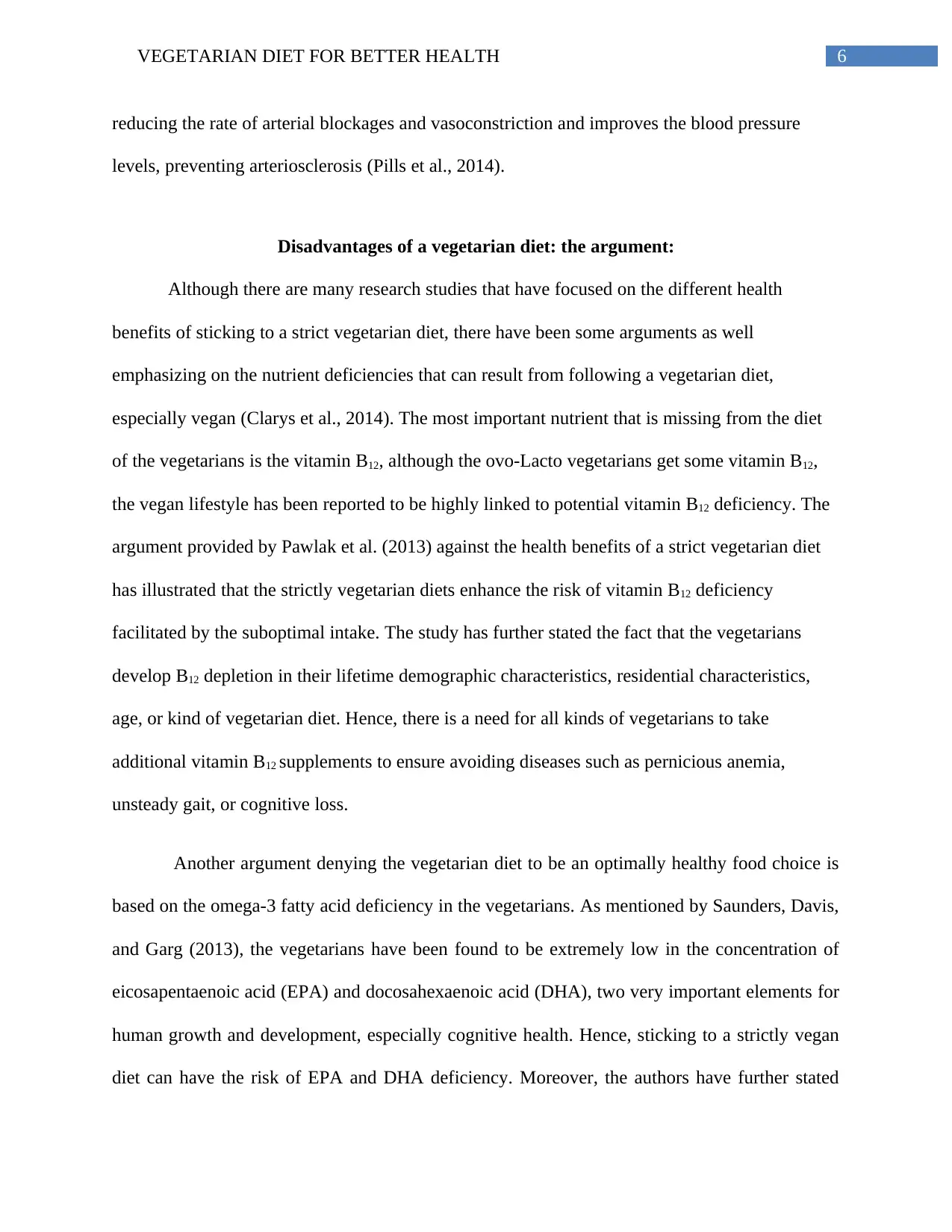
6VEGETARIAN DIET FOR BETTER HEALTH
reducing the rate of arterial blockages and vasoconstriction and improves the blood pressure
levels, preventing arteriosclerosis (Pills et al., 2014).
Disadvantages of a vegetarian diet: the argument:
Although there are many research studies that have focused on the different health
benefits of sticking to a strict vegetarian diet, there have been some arguments as well
emphasizing on the nutrient deficiencies that can result from following a vegetarian diet,
especially vegan (Clarys et al., 2014). The most important nutrient that is missing from the diet
of the vegetarians is the vitamin B12, although the ovo-Lacto vegetarians get some vitamin B12,
the vegan lifestyle has been reported to be highly linked to potential vitamin B12 deficiency. The
argument provided by Pawlak et al. (2013) against the health benefits of a strict vegetarian diet
has illustrated that the strictly vegetarian diets enhance the risk of vitamin B12 deficiency
facilitated by the suboptimal intake. The study has further stated the fact that the vegetarians
develop B12 depletion in their lifetime demographic characteristics, residential characteristics,
age, or kind of vegetarian diet. Hence, there is a need for all kinds of vegetarians to take
additional vitamin B12 supplements to ensure avoiding diseases such as pernicious anemia,
unsteady gait, or cognitive loss.
Another argument denying the vegetarian diet to be an optimally healthy food choice is
based on the omega-3 fatty acid deficiency in the vegetarians. As mentioned by Saunders, Davis,
and Garg (2013), the vegetarians have been found to be extremely low in the concentration of
eicosapentaenoic acid (EPA) and docosahexaenoic acid (DHA), two very important elements for
human growth and development, especially cognitive health. Hence, sticking to a strictly vegan
diet can have the risk of EPA and DHA deficiency. Moreover, the authors have further stated
reducing the rate of arterial blockages and vasoconstriction and improves the blood pressure
levels, preventing arteriosclerosis (Pills et al., 2014).
Disadvantages of a vegetarian diet: the argument:
Although there are many research studies that have focused on the different health
benefits of sticking to a strict vegetarian diet, there have been some arguments as well
emphasizing on the nutrient deficiencies that can result from following a vegetarian diet,
especially vegan (Clarys et al., 2014). The most important nutrient that is missing from the diet
of the vegetarians is the vitamin B12, although the ovo-Lacto vegetarians get some vitamin B12,
the vegan lifestyle has been reported to be highly linked to potential vitamin B12 deficiency. The
argument provided by Pawlak et al. (2013) against the health benefits of a strict vegetarian diet
has illustrated that the strictly vegetarian diets enhance the risk of vitamin B12 deficiency
facilitated by the suboptimal intake. The study has further stated the fact that the vegetarians
develop B12 depletion in their lifetime demographic characteristics, residential characteristics,
age, or kind of vegetarian diet. Hence, there is a need for all kinds of vegetarians to take
additional vitamin B12 supplements to ensure avoiding diseases such as pernicious anemia,
unsteady gait, or cognitive loss.
Another argument denying the vegetarian diet to be an optimally healthy food choice is
based on the omega-3 fatty acid deficiency in the vegetarians. As mentioned by Saunders, Davis,
and Garg (2013), the vegetarians have been found to be extremely low in the concentration of
eicosapentaenoic acid (EPA) and docosahexaenoic acid (DHA), two very important elements for
human growth and development, especially cognitive health. Hence, sticking to a strictly vegan
diet can have the risk of EPA and DHA deficiency. Moreover, the authors have further stated
Paraphrase This Document
Need a fresh take? Get an instant paraphrase of this document with our AI Paraphraser
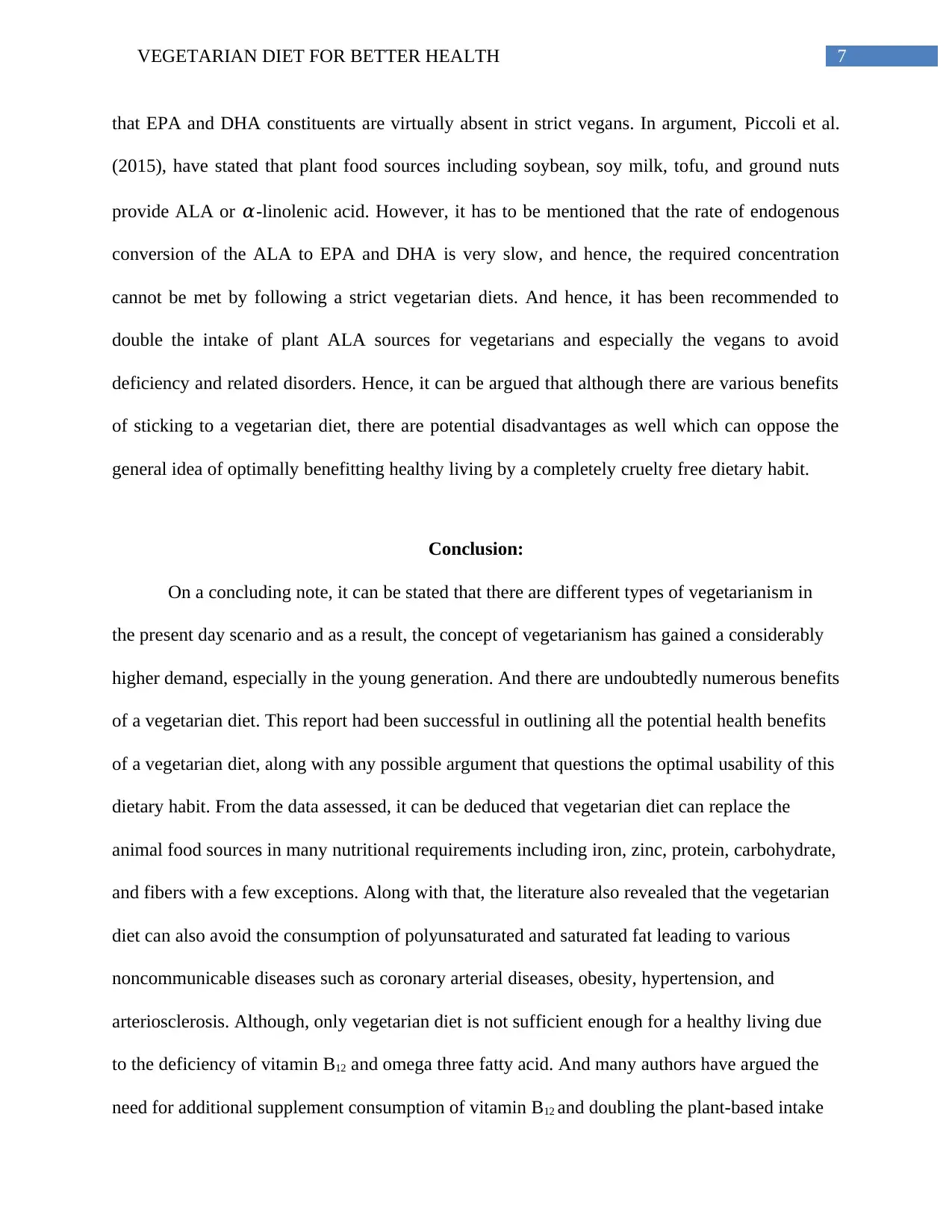
7VEGETARIAN DIET FOR BETTER HEALTH
that EPA and DHA constituents are virtually absent in strict vegans. In argument, Piccoli et al.
(2015), have stated that plant food sources including soybean, soy milk, tofu, and ground nuts
provide ALA or 𝛼-linolenic acid. However, it has to be mentioned that the rate of endogenous
conversion of the ALA to EPA and DHA is very slow, and hence, the required concentration
cannot be met by following a strict vegetarian diets. And hence, it has been recommended to
double the intake of plant ALA sources for vegetarians and especially the vegans to avoid
deficiency and related disorders. Hence, it can be argued that although there are various benefits
of sticking to a vegetarian diet, there are potential disadvantages as well which can oppose the
general idea of optimally benefitting healthy living by a completely cruelty free dietary habit.
Conclusion:
On a concluding note, it can be stated that there are different types of vegetarianism in
the present day scenario and as a result, the concept of vegetarianism has gained a considerably
higher demand, especially in the young generation. And there are undoubtedly numerous benefits
of a vegetarian diet. This report had been successful in outlining all the potential health benefits
of a vegetarian diet, along with any possible argument that questions the optimal usability of this
dietary habit. From the data assessed, it can be deduced that vegetarian diet can replace the
animal food sources in many nutritional requirements including iron, zinc, protein, carbohydrate,
and fibers with a few exceptions. Along with that, the literature also revealed that the vegetarian
diet can also avoid the consumption of polyunsaturated and saturated fat leading to various
noncommunicable diseases such as coronary arterial diseases, obesity, hypertension, and
arteriosclerosis. Although, only vegetarian diet is not sufficient enough for a healthy living due
to the deficiency of vitamin B12 and omega three fatty acid. And many authors have argued the
need for additional supplement consumption of vitamin B12 and doubling the plant-based intake
that EPA and DHA constituents are virtually absent in strict vegans. In argument, Piccoli et al.
(2015), have stated that plant food sources including soybean, soy milk, tofu, and ground nuts
provide ALA or 𝛼-linolenic acid. However, it has to be mentioned that the rate of endogenous
conversion of the ALA to EPA and DHA is very slow, and hence, the required concentration
cannot be met by following a strict vegetarian diets. And hence, it has been recommended to
double the intake of plant ALA sources for vegetarians and especially the vegans to avoid
deficiency and related disorders. Hence, it can be argued that although there are various benefits
of sticking to a vegetarian diet, there are potential disadvantages as well which can oppose the
general idea of optimally benefitting healthy living by a completely cruelty free dietary habit.
Conclusion:
On a concluding note, it can be stated that there are different types of vegetarianism in
the present day scenario and as a result, the concept of vegetarianism has gained a considerably
higher demand, especially in the young generation. And there are undoubtedly numerous benefits
of a vegetarian diet. This report had been successful in outlining all the potential health benefits
of a vegetarian diet, along with any possible argument that questions the optimal usability of this
dietary habit. From the data assessed, it can be deduced that vegetarian diet can replace the
animal food sources in many nutritional requirements including iron, zinc, protein, carbohydrate,
and fibers with a few exceptions. Along with that, the literature also revealed that the vegetarian
diet can also avoid the consumption of polyunsaturated and saturated fat leading to various
noncommunicable diseases such as coronary arterial diseases, obesity, hypertension, and
arteriosclerosis. Although, only vegetarian diet is not sufficient enough for a healthy living due
to the deficiency of vitamin B12 and omega three fatty acid. And many authors have argued the
need for additional supplement consumption of vitamin B12 and doubling the plant-based intake
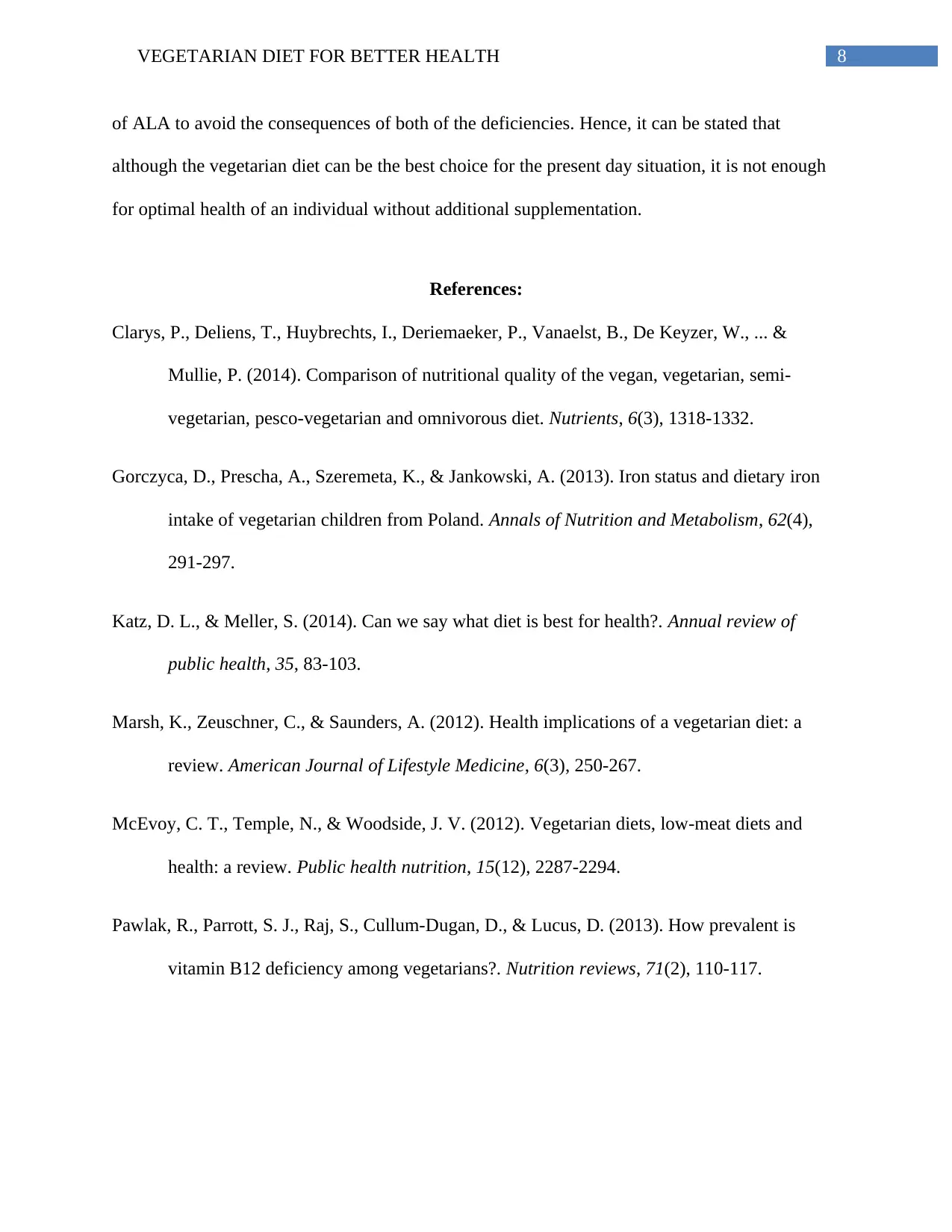
8VEGETARIAN DIET FOR BETTER HEALTH
of ALA to avoid the consequences of both of the deficiencies. Hence, it can be stated that
although the vegetarian diet can be the best choice for the present day situation, it is not enough
for optimal health of an individual without additional supplementation.
References:
Clarys, P., Deliens, T., Huybrechts, I., Deriemaeker, P., Vanaelst, B., De Keyzer, W., ... &
Mullie, P. (2014). Comparison of nutritional quality of the vegan, vegetarian, semi-
vegetarian, pesco-vegetarian and omnivorous diet. Nutrients, 6(3), 1318-1332.
Gorczyca, D., Prescha, A., Szeremeta, K., & Jankowski, A. (2013). Iron status and dietary iron
intake of vegetarian children from Poland. Annals of Nutrition and Metabolism, 62(4),
291-297.
Katz, D. L., & Meller, S. (2014). Can we say what diet is best for health?. Annual review of
public health, 35, 83-103.
Marsh, K., Zeuschner, C., & Saunders, A. (2012). Health implications of a vegetarian diet: a
review. American Journal of Lifestyle Medicine, 6(3), 250-267.
McEvoy, C. T., Temple, N., & Woodside, J. V. (2012). Vegetarian diets, low-meat diets and
health: a review. Public health nutrition, 15(12), 2287-2294.
Pawlak, R., Parrott, S. J., Raj, S., Cullum-Dugan, D., & Lucus, D. (2013). How prevalent is
vitamin B12 deficiency among vegetarians?. Nutrition reviews, 71(2), 110-117.
of ALA to avoid the consequences of both of the deficiencies. Hence, it can be stated that
although the vegetarian diet can be the best choice for the present day situation, it is not enough
for optimal health of an individual without additional supplementation.
References:
Clarys, P., Deliens, T., Huybrechts, I., Deriemaeker, P., Vanaelst, B., De Keyzer, W., ... &
Mullie, P. (2014). Comparison of nutritional quality of the vegan, vegetarian, semi-
vegetarian, pesco-vegetarian and omnivorous diet. Nutrients, 6(3), 1318-1332.
Gorczyca, D., Prescha, A., Szeremeta, K., & Jankowski, A. (2013). Iron status and dietary iron
intake of vegetarian children from Poland. Annals of Nutrition and Metabolism, 62(4),
291-297.
Katz, D. L., & Meller, S. (2014). Can we say what diet is best for health?. Annual review of
public health, 35, 83-103.
Marsh, K., Zeuschner, C., & Saunders, A. (2012). Health implications of a vegetarian diet: a
review. American Journal of Lifestyle Medicine, 6(3), 250-267.
McEvoy, C. T., Temple, N., & Woodside, J. V. (2012). Vegetarian diets, low-meat diets and
health: a review. Public health nutrition, 15(12), 2287-2294.
Pawlak, R., Parrott, S. J., Raj, S., Cullum-Dugan, D., & Lucus, D. (2013). How prevalent is
vitamin B12 deficiency among vegetarians?. Nutrition reviews, 71(2), 110-117.
⊘ This is a preview!⊘
Do you want full access?
Subscribe today to unlock all pages.

Trusted by 1+ million students worldwide
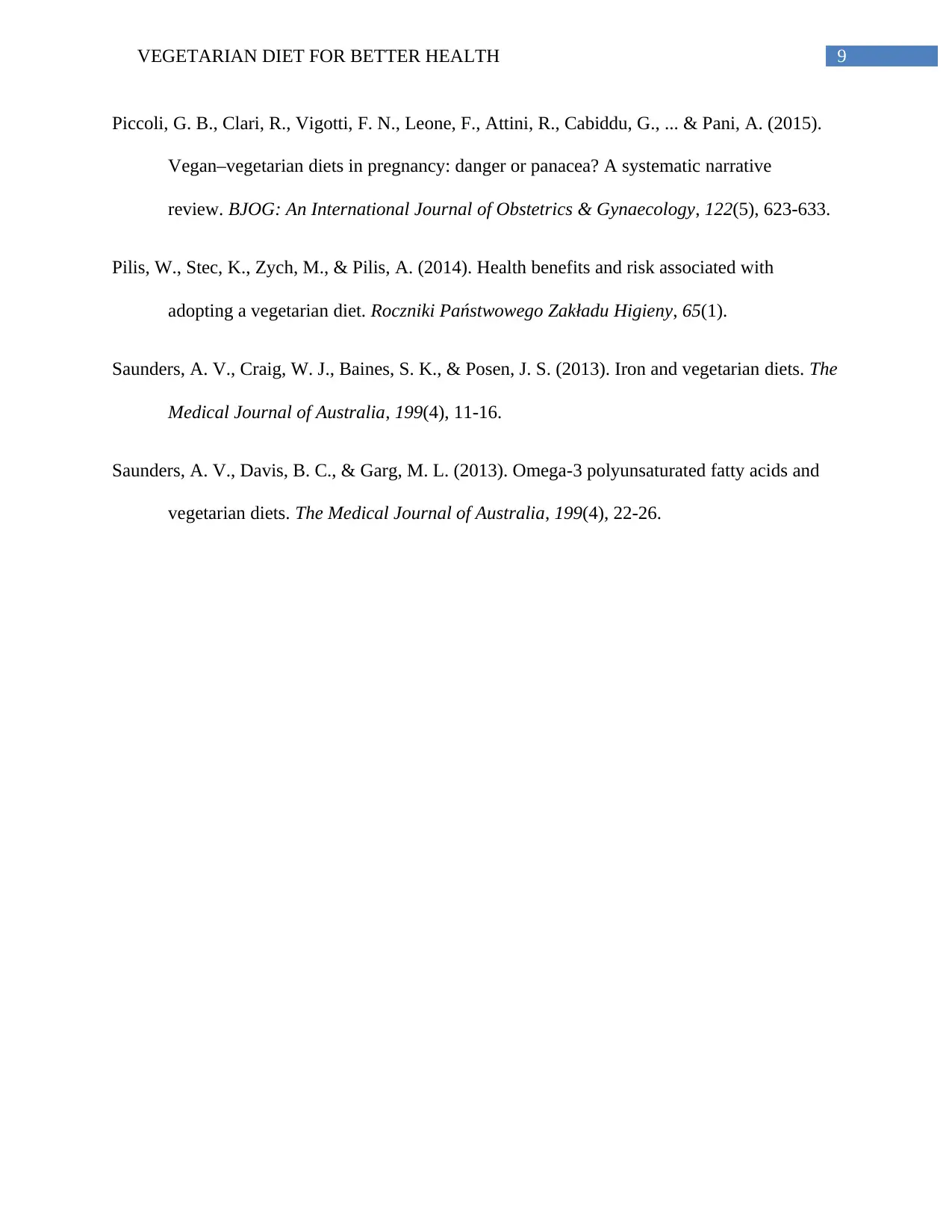
9VEGETARIAN DIET FOR BETTER HEALTH
Piccoli, G. B., Clari, R., Vigotti, F. N., Leone, F., Attini, R., Cabiddu, G., ... & Pani, A. (2015).
Vegan–vegetarian diets in pregnancy: danger or panacea? A systematic narrative
review. BJOG: An International Journal of Obstetrics & Gynaecology, 122(5), 623-633.
Pilis, W., Stec, K., Zych, M., & Pilis, A. (2014). Health benefits and risk associated with
adopting a vegetarian diet. Roczniki Państwowego Zakładu Higieny, 65(1).
Saunders, A. V., Craig, W. J., Baines, S. K., & Posen, J. S. (2013). Iron and vegetarian diets. The
Medical Journal of Australia, 199(4), 11-16.
Saunders, A. V., Davis, B. C., & Garg, M. L. (2013). Omega-3 polyunsaturated fatty acids and
vegetarian diets. The Medical Journal of Australia, 199(4), 22-26.
Piccoli, G. B., Clari, R., Vigotti, F. N., Leone, F., Attini, R., Cabiddu, G., ... & Pani, A. (2015).
Vegan–vegetarian diets in pregnancy: danger or panacea? A systematic narrative
review. BJOG: An International Journal of Obstetrics & Gynaecology, 122(5), 623-633.
Pilis, W., Stec, K., Zych, M., & Pilis, A. (2014). Health benefits and risk associated with
adopting a vegetarian diet. Roczniki Państwowego Zakładu Higieny, 65(1).
Saunders, A. V., Craig, W. J., Baines, S. K., & Posen, J. S. (2013). Iron and vegetarian diets. The
Medical Journal of Australia, 199(4), 11-16.
Saunders, A. V., Davis, B. C., & Garg, M. L. (2013). Omega-3 polyunsaturated fatty acids and
vegetarian diets. The Medical Journal of Australia, 199(4), 22-26.
1 out of 10
Related Documents
Your All-in-One AI-Powered Toolkit for Academic Success.
+13062052269
info@desklib.com
Available 24*7 on WhatsApp / Email
![[object Object]](/_next/static/media/star-bottom.7253800d.svg)
Unlock your academic potential
Copyright © 2020–2025 A2Z Services. All Rights Reserved. Developed and managed by ZUCOL.





